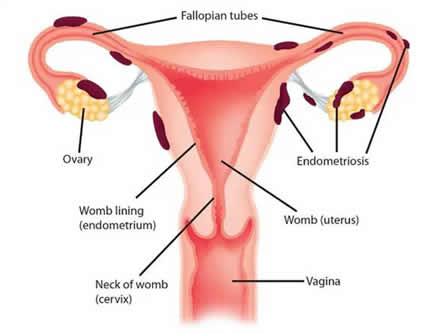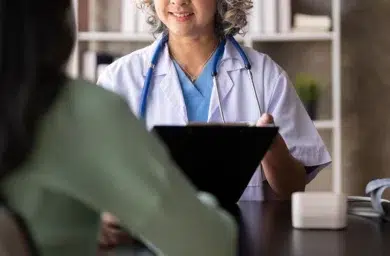If left undiagnosed and untreated, endometriosis is a disease that can slowly and steadily wreak havoc on a woman’s reproductive system, overall health, and livelihood.
But it doesn’t have to if caught early enough.
Dr. Melanie Marin, a 21-year OB-GYN who also specializes in endometriosis, says the disease often presents very obvious red flags that women definitely shouldn’t ignore, and as soon as they see them, a visit to a specialist is a must.
“The most common thing that I’ve run across are women who have painful periods that interfere with their life,” Marin, 51, tells The Blossom. “Meaning, their workday or their relationships, their ability to have intercourse, their ability to exercise,” she says, are all encumbered by endometriosis, “and they assume that that’s normal.”
Marin advises that women should first take the NSAID test. “If it’s not relieved with Advil or Aleve and you can’t continue with your life while you have your period, that’s not normal, and you should be evaluated.”
Another indicator women must pay attention to, says Marin, is how intercourse feels.
“Women think that having pain with intercourse is normal and that actually is not true. What I’m always surprised by is, how much pain people tolerate with having sex or with their periods. They think they just have to tolerate it because they’re women, and that’s just not the case.”
Documenting bowel changes that occur on and around the period can also reveal more red flags, like persistent diarrhea, painful urination, as well as abnormally painful ovulation, bloating and a “feeling of fullness in the abdomen,” she adds.
Dr. James Kondrup, a Binghampton, NY-based endometriosis specialist and surgeon of 30 years, says that, conversely, the disease may present itself asymptomatically for years, before reaching a sudden fever pitch.
“The most key thing for endometriosis is the progression of symptoms,” Kondrup, 59, tells The Blossom. “In other words, a person who has not had pain before starts to get worsening pain over time. So one of the common things I hear from my patients with endometriosis is that ‘My pain used to be tolerable, but now its like I have to take a lot of medicine. I’m chewing Motrin or ibuprofen like crazy, or I’m starting to miss school. Or, ‘I’m down and out I’m laying on the floor curled up with a water bottle.'”
If a woman suspects she indeed has endometriosis, Marin suggests skipping your general OB-GYN and go straight to an endometriosis specialist. “You don’t necessarily have to end up with surgery, but at least if you have someone who knows what they’re doing, they know what your options for treatment are, and they’re going to reasonably discuss things with you.”
That discussion is one that Kondrup wants women to lead.
“I think women need to go interview their surgeon just as if they’re interviewing for a job. All OB-GYN’s will perform a laparoscopy on women. The question is when they encounter endometriosis what will they do with it? Ask them: how often do you treat endometriosis? What technique do you do? What if you find the endometriosis on my bowel or on my bladder or near my ureter, what do you do?’ And if you’re not happy with that surgeon’s answers, go find another surgeon.”

The associated symptoms of endometriosis are different for different women, and usually depend on where the extra tissue is located. The most common endometriosis symptoms include:
- Abdominal and pelvic pain
- Extremely painful periods
- Heavy periods
- Pain during intercourse
- Fertility problems
- Pain with restroom use
To definitively diagnose endometriosis, women must complete a biopsy in order to visualize the misplaced tissue.
Understandably, this can seem like an invasive operation, but at our women’s health clinic, we do our best to piece the diagnosis together in a timely manner, hoping to achieve this in a comfortable setting for our patient. Based on how the patient presents to us in the clinic, we may suggest that an in-office vaginal ultrasound or laparoscopy to be carried out to ensure that we don’t overlook other issues or complications that could be contributing to the patient’s endometriosis symptoms.
For more information about endometriosis, contact your San Antonio OB/GYN today at (210)222-2694!
If you are looking for more information about the diagnosis and treatment of endometriosis because you believe you may have this condition, please contact our office to set up an appointment with Dr. Bhatia. We look forward to helping you understand your endometriosis and what your next steps will be to maintain the active lifestyle that you enjoy.
0



